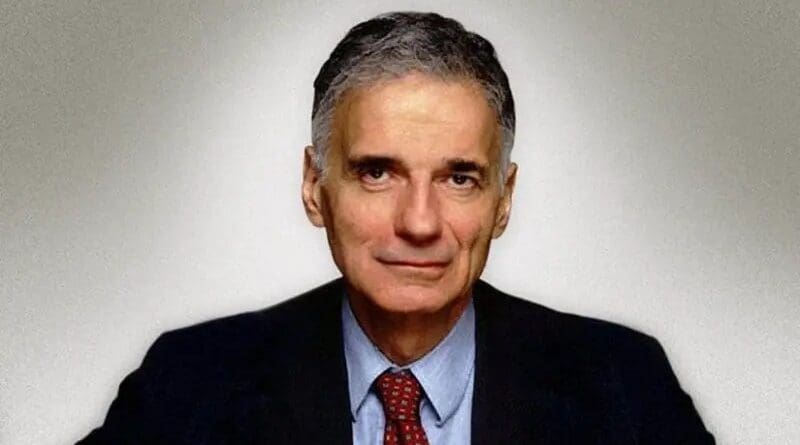Ralph Nader: Outlines Criteria For Next FAA Administrator – Letter
By Ralph Nader
On July 10, 2019 the Senate Commerce, Science, and Transportation Committee voted 14-12 in favor of Mr. Dickson’s nomination. The nomination will now go to the full Senate for a vote.
On July 11, 2019, Ralph Nader sent a letter to President Donald Trump regarding Stephen Dickson, his nominee to be the next Federal Aviation Administration (FAA) Administrator. See the letter below.
July 11, 2019
President Donald J. Trump
The White House
1600 Pennsylvania Ave. NW
Washington, D.C. 20500
The Senate Commerce, Science & Transportation Committee today voted to advance the nomination of Stephen Dickson to become the Administrator of the Federal Aviation Administration (FAA).
Concerns about Mr. Dickson’s appreciation of and support for whistleblowers have come to light. Recently, whistleblowers have exposed significant problems with the Boeing 737 MAX before and after the crashes in Indonesia and Ethiopia. Unfortunately, the FAA’s attention and response to whistleblower disclosures are seriously lacking. These tragic crashes have also revealed significant problems with the FAA’s regulatory oversight of aircraft manufacturing that jeopardize public safety. Given the importance of regulating airline carriers and aircraft manufacturers, the FAA Administrator should be receptive to issues related to air safety and passenger rights. Whistleblowers from within the FAA and the airline industry play crucial roles in alerting the public, Congress and the media to potential air safety matters.
Evidence of regulatory lapses regarding the 737 MAX has eroded public trust and confidence in the FAA. In addition, the lack of candor by Boeing has created a situation where a plane was allowed to fly without proper safety oversight and without the benefit of proper pilot training.
The Statement of Captain Chesley B. “Sully” Sullenberger III before the Subcommittee on Aviation of The United States House Committee on Transportation and Infrastructure (June 19, 2019) is clear and compelling and should be required reading for the next FAA Administrator. Attached please find a summary of some of the things Captain Sullenberger has said about the 737 MAX.
Several air safety leaders have recommended additional mandatory simulator training regarding the Maneuvering Characteristics Augmentation System (MCAS) scenarios as part of routine recurrent training. Pilots have said that without proper simulator training, pilots are not prepared to respond to MCAS malfunctions.
In his June 19, 2019 testimony before the House Committee on Transportation and Infrastructure, Daniel Carey, a 35-year career captain with American Airlines and president of the Allied Pilots Association (APA) said:
- The 737 MAX was designed to provide the same aircraft feel to the pilots as the 737. This was intended to minimize the operating cost to Boeing’s customers by allowing the MAX to be certified by the FAA as a 737. The point was to provide Boeing’s customers with a new advanced aircraft while minimizing the training cost associated with a different aircraft certification. This led Boeing’s engineers to add the MCAS system. Many mistakes were subsequently made by Boeing engineers as MCAS was designed as a “federated” not “integrated” system. As a single-point-of-failure design, this meant that any redundancy to the system, if it failed, was completely dependent on the Captain and First Officer of the aircraft.
- The huge error of omission is that Boeing failed to disclose the existence of MCAS to the pilot community.
- The final fatal mistake was, therefore, the absence of robust pilot training in the event that the MCAS failed.
It is imperative that the next FAA Administrator resist industry and political pressure to unground the 737 MAX without a full, top to bottom, certification and review of this aircraft. Moreover, the certification must have comprehensive and independent oversight by properly trained FAA officials.
Victims’ families, consumer advocates, flight attendant representatives, pilot representatives, mechanics, aircraft controllers and other stakeholders should be represented on the FAA panel that oversees full recertification of the 737 MAX. The process should be transparent and thorough. There should be opportunities for public comment and input. Boeing and airlines – not the public via taxes and fees – should shoulder all costs associated with assessing the MAX and compensating the victims’ families.
It is also important that an independent advisory board with members from the consumer and airline safety communities be involved in reviewing the FAA’s oversight of the airline industry.
The attached recommendations (some old and some new) from oversight bodies, airline safety organizations and airline professionals regarding the FAA should be presented to Mr. Dickson for his review. The public deserves to know if Mr. Dickson possesses the requisite determination and independence to think broadly about the FAA’s deficiencies and take immediate corrective actions. More importantly, we need to know if Mr. Dickson will act boldly to start the process of making the FAA a more effective watchdog rather than an industry lapdog.
Passenger and crew safety equals public trust equals the future of the airline industry.
Sincerely,
Ralph Nader
P.O. Box 19312
Washington, DC 20036

